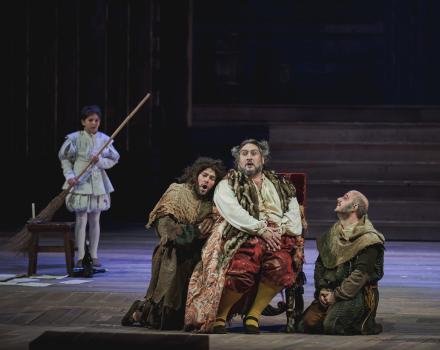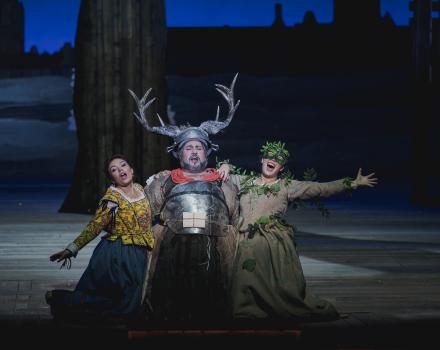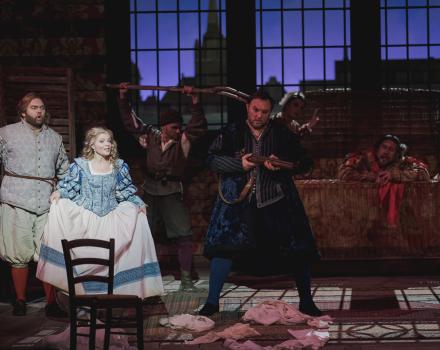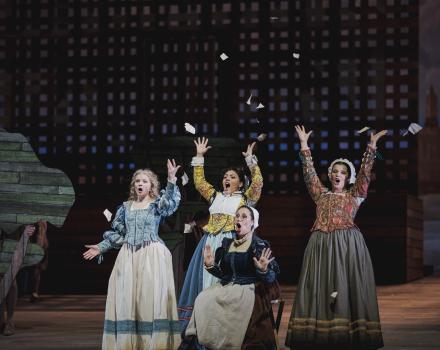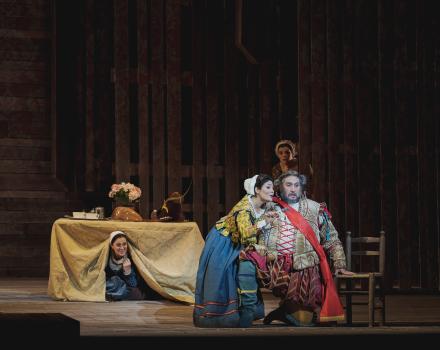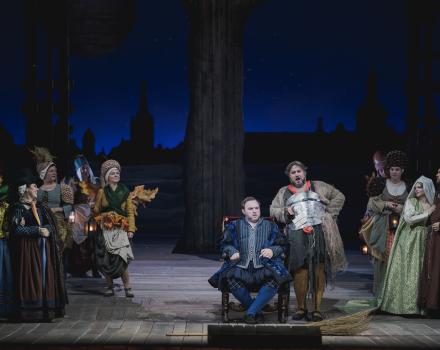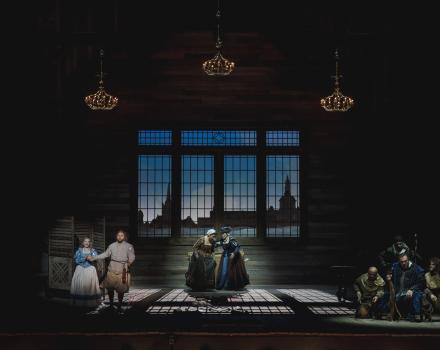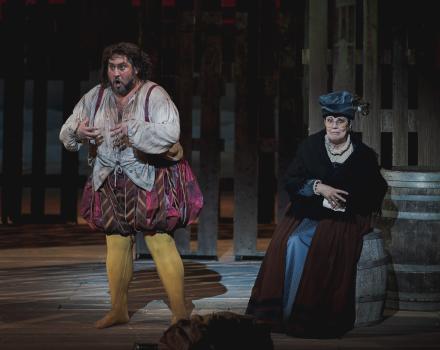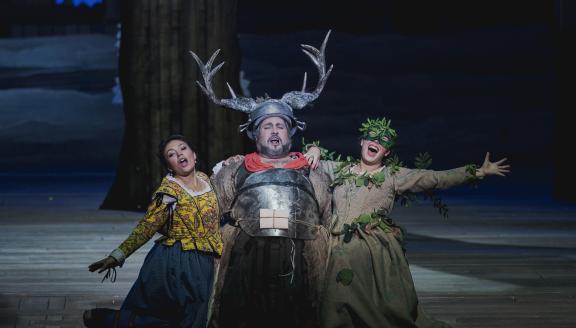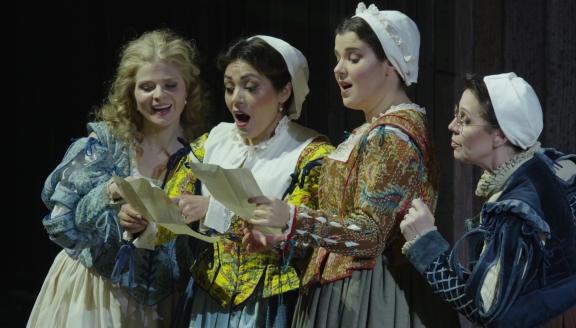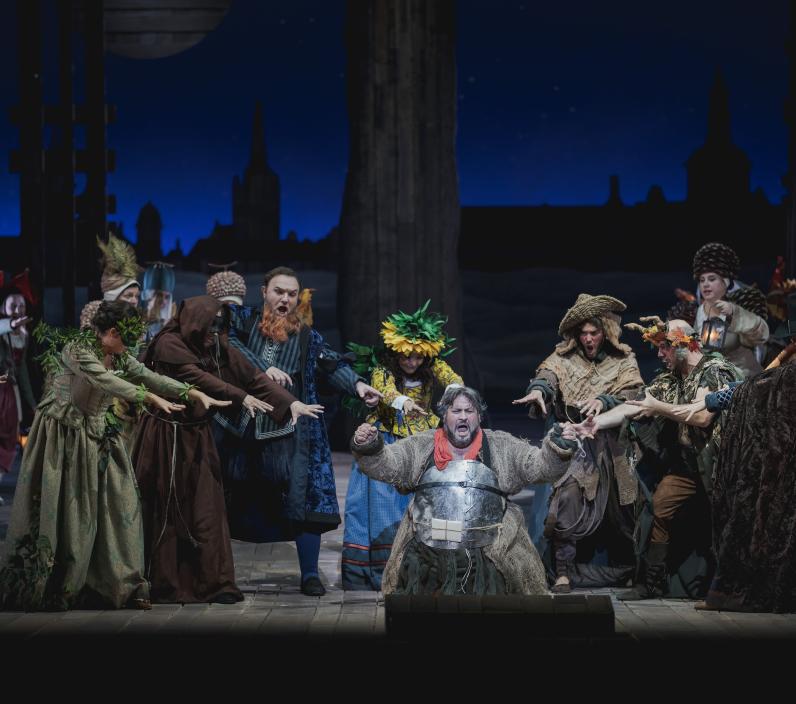
Falstaff
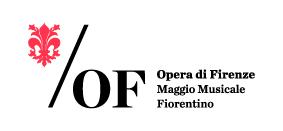
The lecherous Falstaff, with his infamous roving eye, finally meets his match when his underhand plans to solve money troubles have the three merry wives of Windsor conspiring to teach him a lesson.
On 9 February 1893, the premiere of Falstaff was a tremendous success at Teatro alla Scala. After more than fifty years spent in setting dramas and torments of the human soul to music, Verdi greeted the world of opera with the worldly-wise smile of someone who had experienced everything to the fullest. Falstaff is the work of an amusing and amused Verdi; the score abounds in musical experimentation. As sung in the finale: ‘Tutto nel mondo è burla. L’uom è nato burlone.’ [‘Everything in the world is a jest. Man is born a jester.’] Baritone Nicola Alaimo stars as the caddish knight, gleefully tormented by a trio of clever women who deliver his comeuppance. Sir John Eliot Gardiner conducts a fine ensemble cast directed by Sven-Eric Bechtolf. The result is a joyful production, with gorgeous costumes that seem to inspire those wearing them as much as they will delight OperaVision viewers.
Cast
Sir John Falstaff | Nicola Alaimo |
|---|---|
Ford | Simone Piazzola |
Fenton | Matthew Swensen |
Dr. Caius | Christian Collia |
Bardolfo | Antonio Garés |
Pistola | Gianluca Buratto |
Mrs. Alice Ford | Ailyn Pérez |
Nannetta | Francesca Boncompagni |
Mrs. Quickly | Sara Mingardo |
Mrs. Meg Page | Caterina Piva |
Chorus | Chorus del Maggio Musicale Fiorentino |
Orchestra | Orchestra del Maggio Musicale Fiorentino |
| ... | |
Music | Giuseppe Verdi |
|---|---|
Text | Arrigo Boito |
Conductor | Sir John Eliot Gardiner |
Director | Sven-Eric Bechtolf |
Sets | Julian Crouch |
Costumes | Kevin Pollard |
| ... | |
VIDEO
Story
Act I
Doctor Caius has come to complain to Sir John Falstaff that Bardolfo and Pistola, Falstaff's unruly companions, have made him drunk and robbed him. They laugh at him until he leaves the inn in a fury. The landlord presents a bill and it becomes clear that Falstaff is chronically short of funds. He reveals a masterplan to remedy the situation by seducing two women, Alice Ford and Meg Page, the wives of wealthy Windsor gentlemen. When Bardolfo and Pistola refuse to be part of his plans, Falstaff is outraged by their trumped-up excuses and throws them out.
Alice and Meg discover that they have received identical love letters from Falstaff and decide to teach him a lesson. Mistress Quickly agrees to help them by luring him to a rendezvous. In the meantime, Bardolfo and Pistola have told Ford of Falstaff's plans, in the hope of financial recompense. Ford decides to test his wife's virtue by visiting Falstaff in disguise and pretending to ask his assistance in seducing her. His daughter, Nannetta, and her lover, Fenton, snatch illicit kisses whenever they find the opportunity.
Act II
Bardolfo and Pistola beg to be allowed to return to Falstaff's service. Mistress Quickly comes to give Falstaff replies from both Meg and Alice, inviting him to visit Alice later that day. Matters appear to be proceeding even more satisfactorily when Falstaff is offered cash by a stranger calling himself Brook (he is in fact Ford in disguise) to soften up Alice for him by seducing her. Falstaff agrees with alacrity and, while he prepares for amorous conquest, Ford rages against his wife and her suspected infidelity.
Nannetta bewails the fact that her father is trying to marry her off to Doctor Caius. Alice reassures her and, with Meg and Mistress Quickly, makes preparations to receive Falstaff. They plan to pretend that her husband has returned home unexpectedly and force him to hide in a laundry basket. All goes according to plan until Quickly announces that Ford is really on his way home, determined to surprise Falstaff with his unfaithful wife. In the ensuing chaos, Falstaff and the dirty laundry are tipped into the River Thames and the only lovers to be discovered are Nannetta and Fenton. Ford is forced to admit that he was wrong to suspect Alice.
Act III
Falstaff rails against the injustice of his treatment and Mistress Quickly has some difficulty in persuading him to succumb to a second invitation from Alice. Eventually he agrees to meet her that night in Windsor Forest where, according to local legend, witches gather and the ghost of Herne the Huntsman is sometimes seen. Quickly advises him to scare off anyone who might see him by adopting the guise of Herne the Huntsman, wearing stag's antlers on his head. Falstaff is unaware that everyone in Windsor is planning to trick him and that they all intend to be in the Forest that night, wearing various disguises. Ford revels in the prospect of getting his own back on Falstaff and is also determined to force his daughter to marry Doctor Caius. Mistress Quickly overhears him and works out a way of tricking him as well, by dressing someone else in Nannetta's costume as Queen of the Fairies.
As midnight approaches, people begin to gather in the Forest. Falstaff appears and makes strenuous efforts to seduce Alice. As supernatural noises are heard in the distance she runs away, leaving Falstaff to be tormented by disguised townspeople. It is only when he recognises Bardolfo's flaming red nose that the trick is uncovered. Ford mocks Falstaff and then gives his blessing to the union of two couples, assuming one pair to be Caius and Nannetta. When they take off their disguises he finds that he has approved Nannetta's marriage to Fenton and that Doctor Caius has been joined to Bardolfo. The women delight in their triumph over the men's suspicions and vanities and Falstaff leads everyone in a final burst of laughter.
Insights
Falstaff in Verdi’s own words
An ardent fan of Shakespeare, Giuseppe Verdi wrote his last opera, Falstaff with the librettist Arrigo Boito, who played a very important role in the last phase of Verdi's creative life. With Boito, the composer reworked Simon Boccanegra in 1880 and wrote Otello in 1887. The role of Falstaff was interpreted by Victor Maurel, the French baritone who sang Jago at the premiere of Otello. Writing to Boito about Jago, Verdi said: ‘It is a curious thing! The part of Jago, except for a few éclats, could all be sung in half voice!’ The same could also be said of Falstaff. During the gestation of Falstaff, he wrote to his publisher Ricordi to warn him that he would like to devote particular care to rehearsals on the harpsichord since his new opera 'will have to be sung differently from other modern comic operas, or from ancient comic operas. [...] Our singers do not generally know how to make a big voice; they have no elasticity of voice, nor clear and easy phrasing, and they lack accent and breath'. Verdi here distances himself from the melodramatic tradition of which he was descendant. Falstaff is in a sense a posthumous opera. The composer's drive for comedy in operas such as Un ballo in maschera and La forza del destino is certainly there. Verdi wrote to music critic Gino Monaldi in 1890: 'I have wanted to write a comic opera for forty years, and I have known The Merry Wives of Windsor for fifty years.' But perhaps Falstaff is in essence more ironic than comic. It is full of melancholy. When it was staged at La Scala on 9 February 1893, everyone knew that Falstaff would be Verdi's last opera. When he bid farewell to Ricordi at the end of 1892, now approaching the age of eighty, the composer attached this impassioned, melancholic and poignant farewell note to his last work:
“Le ultime note del Falstaff. Tutto è finito! Va, va vecchio John… Cammina per la tua via, finché tu puoi… Divertente tipo di briccone; eternamente vero, sotto maschere diverse, in ogni tempo, in ogni luogo! Va… Va… Cammina cammina… Addio!!!”
'The last notes of Falstaff. It's all over! Go, go old John... Walk your way, while you can... Funny kind of rascal; eternally true, under different masks, in all times, in all places! Go... Go... Walk, walk, walk... Goodbye!!!".
Adapted from a text first published in the Maggio Musicale Fiorentino programme written by Emilio Sala.
Gallery
